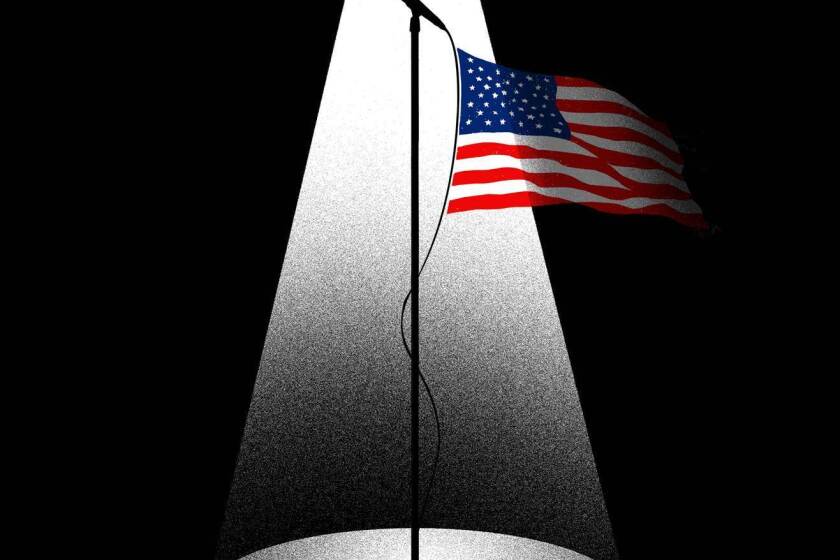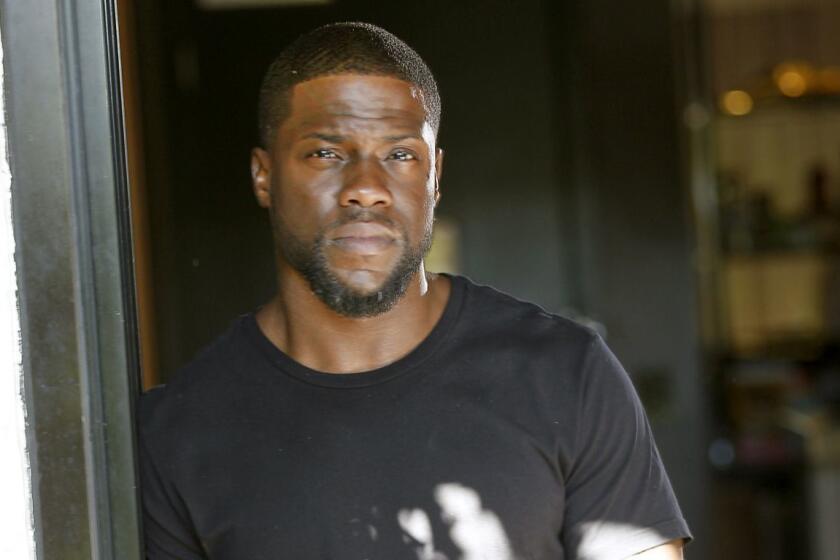Commentary: ‘SNL’ deserves the Shane Gillis backlash. It’s been courting liberals for years
It was no parody when “Saturday Night Live” announced this week that the cast for its 45th season would include Bowen Yang, an openly gay Asian American comedian, and Shane Gillis, a comedian whose portfolio includes bigoted jokes about Asians and gays. And Muslims. And pretty much everyone else who’s not a straight white man.
NBC’s late-night institution took a public shellacking Thursday within hours of the announcement, when journalist Seth Simons drew attention to a September 2018 episode of “Matt and Shane’s Secret Podcast” in which Gillis uses a racist slur. (The podcast’s archives, along with its accompanying YouTube page, appear to have been scrubbed in response to the scrutiny.)
But both the not-so-“Secret” podcast and guest appearances on others have been a cornucopia of damning “humor” from the Philly comedian. Simons, writing for Vice, reported Friday night that Gillis referred to Democratic presidential candidate Andrew Yang by the same slur in an episode of the “Real Ass Podcast” recorded in May of this year — along with several other stretches in which he sounds like a numbskull playing xenophobic Mad Libs. Meanwhile, Vulture reported that Gillis has used homophobic slurs on his podcast as well.
It’s in keeping with the clip that kicked off the controversy. Equally as idiotic, the conversation between Gillis and co-host Matt McCusker is a long rant on why they can’t stand Chinese people, Chinese food and, yes, Chinatown — with Gillis using an unprintable anti-Chinese slur. Gillis and McCusker also crack “funny” like cheap stand ups from another era when they mimic Chinese speaking English, saying “noodre” and “dericious.”
Gillis’ response to the outcry, posted to Twitter late Thursday, was essentially to brush it off: “I’m happy to apologize to anyone who’s actually offended by anything I’ve said,” he wrote.
The non-apology was more than “SNL” or the network offered. (Representatives for NBC have not responded to repeated requests for comment.) The radio silence made it seem as if the blowback caught them off guard.
It shouldn’t have.
Comedians have never been more willing to get political at the mic.
“SNL” has been cultivating progressive bona fides, both in sketches and in casting, for years. On screen, Chance the Rapper lamented the last Christmas with Barack, while Hillary Clinton, played by Kate McKinnon, sang a somber cover of Leonard Cohen’s “Hallelujah” to open the first episode following President Trump’s election victory. Behind the scenes, “SNL” has hired more women of color in the past decade — Nasim Pedrad, Leslie Jones, Sasheer Zamata and Melissa Villaseñor, for starters — than it had in the previous 35 years. Ironically, Gillis’ casting came on the heels of Jones’ announcement that she’s leaving the series.
Even if Gillis was hired to represent disenfranchised frat boys — or millennials pining after a time when women, gays and racial/ethnic minorities had no cultural megaphone to say, “WTF ‘SNL’?!” — there had to be someone else out there who isn’t repurposing the humor of their racist great uncle for laughs. For instance, Gillis has said on the podcast that there’s only one way into “Muslim heaven” (“You gotta spill blood, you gotta praise Allah by spilling blood”), and has referred to women who disguised themselves as men to fight in the American Civil War as “flat chested ... bitch[es].”
A real laugh riot. If it were 1862.
“SNL” should know an attention-seeking bigot when they see one — and there’s no way they didn’t see this coming.
The once-edgy sketch comedy series has a history of lampooning those who deal in hateful rhetoric — exactly like the frequent slurs made by the guy they just hired.
Take the “Racists for Trump” mock campaign ad from 2016: Aimed at the white supremacist voting block, it pictures Americans going about their everyday business, such as ironing their KKK hoods, burning books in a fire and wearing swastika armbands.
The following year, “SNL” host Aziz Ansari delivered an opening monologue that directly confronted the growing threat of Islamophobia and fear of immigrants.
In the crosshairs of outrage: Roseanne, Kathy Griffin and now Kevin Hart. Comedy’s shifting red line
Politics are a joke, and right now, more folks want to laugh than cry over the state of the union.
Another sketch featured a faux panel of Hollywood women addressing sexual assault, recounting their #MeToo moments as a scathing commentary on Harvey Weinstein and his ilk: “Pandora’s box is open now, and Pandora is pissed,” said McKinnon’s character.
Which is why it’s warranted that “SNL” is catching more flak for Gillis’ casting than, say, Netflix has for giving Dave Chappelle’s recent comedy special “Sticks & Stones” a platform.
Designed to offend, Chappelle went after what he sees as victim culture: the men who allege in the documentary “Leaving Neverland” that they were molested as boys by Michael Jackson; thin-skinned “alphabet people” (aka the LGBTQ community); the #MeToo movement; and even schools — for having students practice active shooter drills. So. Not. Funny.
But while Netflix has promoted liberal ideals with shows like “Sense8,” “SNL” has done so consistently since Dan Aykroyd’s Nixon kept warm by burning incriminating audio tapes on the fire.
Think of McKinnon as Jeff Sessions, whose intolerance of the gay community and fear of women is comedic gold. Or Melissa McCarthy as Sean Spicer screaming at the press corps: “Moose-Lambs!” Or Tina Fey’s thick-as-a-brick Sarah Palin. (On the flip side, “SNL” creator Lorne Michaels was criticized in 2015 for normalizing Donald Trump by letting the then-White House hopeful host an episode during his campaign. Michaels was among those blamed for the reality star’s ascent.)
In his Twitter statement, Gillis wrote: “I’m a comedian who pushes boundaries. I sometimes miss... My intention is never to hurt anyone but I am trying to be the best comedian I can be and sometimes that requires risks.”
Gillis may believe he’s breaking barriers with gags based on stale stereotypes, but “SNL” knows better — and they should be better.
More to Read
The complete guide to home viewing
Get Screen Gab for everything about the TV shows and streaming movies everyone’s talking about.
You may occasionally receive promotional content from the Los Angeles Times.









